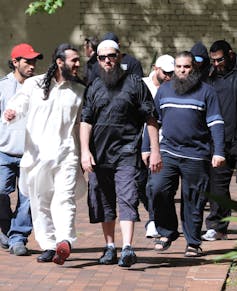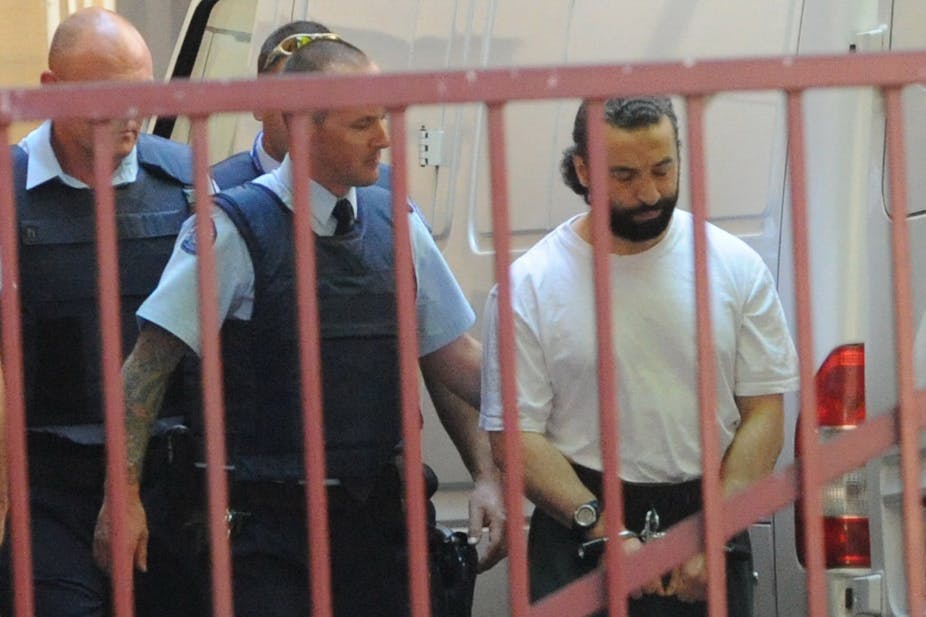The dreadful events in Iraq and Syria and counter-terrorism raids in Australia have alarmed Australians, including the 500,000-strong Muslim community. These incidents represent a new episode of the “third wave” of global “jihad” that began on September 11, 2001.
The latest counter-terrorism operations also point to the limits of existing de-radicalisation programs. These include reinforcing the power and capacity of intelligence and law-enforcement agencies, state sponsorship of “modern Muslims” and investments in education and mentoring.
It seems these programs have underestimated the socioeconomic dynamics of the Muslim community and external factors as drivers of youth radicalisation in Australia.
It is, however, important not simply to treat the radicalisation of young people as a “Muslim issue”. The whole community should come together and ask hard questions about why some young people are so vulnerable to violent extremism.
Tackle the global drivers of radicalisation too
It is disturbing that the alleged offenders appear to be following the same kinds of radical and violent ideologies that some of their parents fled in coming to Australia. Muslims worldwide are the primary victims of groups such as Islamic State (IS).
For Australian Muslims, the rise of a small minority of radical young people is particularly significant. It increases social pressures on the majority who, like most Australians, simply seek to live peaceful lives.
Enduring external forces are a factor in youth radicalisation in Australia and other western countries. These forces have roots in the enduring Palestinian-Israeli conflict, US support for corrupt political regimes in the Middle East, extreme poverty in Yemen and elsewhere and, more importantly, the failures of state entities in Iraq and Syria.
In addition, as Anne Aly observed in The Conversation:
… the traditional seats of power in the Arab world have been toppled, creating a void and opening opportunities for other Arab nations to vie for power.
Thus, the competition for influence between, and within, traditional players like Saudi Arabia, Iran, Turkey and Egypt and emerging Gulf states like Qatar and United Arab Emirates (UAE) has contributed to the regional chaos. IS fighters swiftly exploited the instability by seizing control of much of northern Iraq and Syria. IS is attracting recruits from around the world, including Australia.

Nevertheless, the alleged activities of young Australians like Mohammad Ali Baryalei and Omarjan Azari raise questions about their upbringing. Many radicalised youth are likely to be the second-generation children of migrants and displaced persons resettled in Australia. For this generation, parents who lack English skills and understanding of their new community might struggle to complement the education delivered in schools.
Like the rest of the society, Muslims in Australia are exposed to extremists’ daily propaganda and horrifying actions. Digital technology transmits live images of hatred and war with unprecedented pace and intensity. It is vital then to remember that polarisation of societies like Australia along religious lines is exactly what extremist groups aim to achieve.
As Nick O’Brien argued in The Conversation:
It’s in the interests of Islamic State for Muslims in Australia to be attacked or for their mosques to be attacked, because doing so would help divide the Australian community. But we should be very clear: the only people who win if Australia is divided are the extremists.
Law enforcement won’t win battle for young minds
Any official or public responses that are aimed (overtly or covertly) at a particular community can help IS and the like to achieve their aims. So do outpourings of anti-Muslim sentiment on talkback radio and in online comments and newspaper letters columns.
The US-led coalition should learn from experience that military actions alone will not prevail over radical groups. Rather, “the fight against Islamic State is a battle for young minds”.
This requires concerted effort and renewed political engagement with the region. Australia should work closely with governments and other actors to tackle some of the underlying causes of socio-political upheavals like severe unemployment, rapid urbanisation and failing political systems.
Terrorism expert Greg Barton observes:
There is the need to deal with the struggle for ‘hearts and minds’ of small but significant numbers of Muslim youth and the allure of groups such as IS. We need to understand how IS sells itself if we are to become better at preventing radicalisation and reintegrating those who have become caught in its thrall.
Within Australia, this require more community engagement and understanding. While law enforcement responses might be necessary at a particular point, Australia’s approach should be inclusive of the entire community, particularly radicalised young people and their families, not just “community leaders”.
The community also needs to be more effective in educating youth. They need to understand why the best way to solve problems in the Middle East and elsewhere is not more violence that causes more harm to deprived and oppressed people.
Instead, young Australians should develop and use their educational opportunities and skills to foster people-to-people relationships with the Middle East. And the best way to improve those relationships is to help reduce the poverty and staggering unemployment of populations that corrupt regimes have forgotten for so long.

